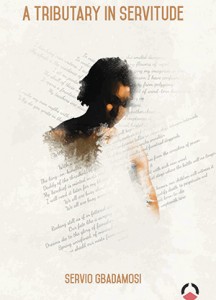Title: A Tributary in Servitude
Author: Servio Gbadamosi
Genre: Poetry
Format: Paperback
Extent: 85 pages
ISBN: 978-978-52838-3-9
Publisher: WriteHouse Collective
One is tempted to say that A Tributary in Servitude is a tribute to the Congolese poet Tchicaya U Tam’si (1931–1988), whose works are basically on the (mainly negative) effects of foreign religions and traditions on Africa. Three out of the six sections that A Tributary in Servitude is divided into open with quotes or excerpts from Tchicaya.
 On the one hand, Servio Gbadamosi delights in playing the griot and curator of the nation’s history/ traditions. On the other hand, he stoops under its crushing weight and bursts out in frustration because he doesn’t seem to have many, or even any, compatriot(s) willing to share his burden. And one of the wonders of this book is the way the poet fuses these two states of mind without seeming to suffer any cognitive dissonance.
On the one hand, Servio Gbadamosi delights in playing the griot and curator of the nation’s history/ traditions. On the other hand, he stoops under its crushing weight and bursts out in frustration because he doesn’t seem to have many, or even any, compatriot(s) willing to share his burden. And one of the wonders of this book is the way the poet fuses these two states of mind without seeming to suffer any cognitive dissonance.
A Tributary in Servitude is a dirge from a crushed spirit and a broken heart. I have wondered why or how Servio Gbadamosi could even afford to sing (albeit a sad one) bearing this crushing load. I remember the book of Psalms 137:4 where the captives at Babylon asked: “How shall we sing (the Lord’s) song in this strange land?” But then, I also remember Samuel Beckett’s: “When you are in the last bloody ditch, there is nothing left but to sing.”
The poem Irritations in the Oyster is the outburst of pent-up anger and frustration. Indeed, every messenger despairs at one time or another in their prophetic career? The prophet Jeremiah has this confession to make: “… Then I said, ‘I will not make mention of Him, nor speak anymore in his name.’ But His word was in my heart like a burning fire shut up in my bones; I was weary of holding it back, and I could not.” Jeremiah 20:9
The burning passion and zeal locked up in the heart of the persona in Irritations in the Oyster eventually bursts and pours out in a wake-up call to the wayward country, nation and people:
“… the waters tumble
out with armoured fists to tame
a prodigal.
My country wobbles
fumbles, tumbles, crumbles…”
While showering encomium on the revivalist who diligently and tenaciously fashions out a new generation, he dismisses the present turbulence as labour pains that precede the birth of something good:
“Hurray for the potter foraging clay
by the burrows of crab…
who, drawing from the ticktack
interpreted the friction within as
irritations permeating an oyster
just before a pearl is born.”
He then calls on the new creation(s) to in turn liberate their brethren who are still in bonds of iron:
“O hatchling, o fledgling
crack with thine feeble beak
the bonds of their iron-
come taste the newness of dawn. “
The nostalgia in this book knows no bound. Even when in love, the poet doesn’t desist from looking back to the very beginning when he was still innocent; when he was “still holy to the bone”. By then, a woman was more or less something to be laughed at and teased; a hand to be shaken condescendingly. In the first movement of the poem Torrents from Silence the poet argues that it is not always a butterfly in the stomach “when two look at two”, be they civilizations or opposite sexes. For some people, it can be a rumble. Or even a hurricane. Which is why the persona begs this queen of hearts to desist from tantalizing him because “my passion jumps at your fickle light”. The persona is such a die-hard that despite being in love with this charming lady whose fickle light he cannot help but trail even to the point of dashing his toe and bleeding, he still mourns that:
“… suddenly
they now appear the guide
piloting the music of my dreams…
where is my innocence?”
And then, as if on second thought, he admits that not only does he enjoy loving her and that “she still leads the way to my morrow…”
There are times that A Tributary in Servitude reads like the transcript of a griot’s notebook. Or put more precisely, there are times the book reads like the transliteration of Yoruba incantation.
“I salute each nut
with a wand of rock.
I salute each nut
with a wand of rock.” (pp 44)
Thus begins the poem, Prelude to Tears, which talks about ‘us’ and ‘them’; how ‘they’ robbed ‘us’. It is a mourning of lost pride and heritage; a mockery of naivety and gullibility. If the poems in this book were to be arranged chronologically (and who says they aren’t?), perhaps Prelude to Tears would come first. For me, it traces the very beginning of the end.
“Dreams die to the glory of famished gods”
Basically, there are two reasons why people abandon their gods: (a) when the gods under-supply peace and prosperity; (b) when the gods over-supply peace and prosperity. An instance of the first case is in Chinua Achebe’s Arrow of God where the people of Aninta destroyed their deity, Ogba, when it stops doing what it is looked upon to do. The Old Testament section of the Bible is full of accounts where the people become lax in their devotion to God once they begin to enjoy peace and prosperity for so long. But for whatever reason, once the gods are put away, calamity is bound to befall the people to the delight of the abandoned God(s).
A people in disarray is a people heading to the rocks. They get busy making so much bang with little impact; so much flash with no fire.
“We were busy shouting
We were busy swearing”
And things are busy falling apart. Will Durant (1885-1981) couldn’t have been more apt when he said “A great civilization is not conquered from without until it has destroyed itself within.”
“If you examine the stories
And force them through a sieve
You will see what I see-
The pot was leaking before it broke.”
And then:
“They laughed, we laughed, and they laughed
we cried, they laughed and laughed and laughed;”
This calls to mind some lines from David Rubadiri’s Stanley Meets Mutesa:
“No more the burning heat of the day
But song, laughter and dance…
The gate of polished reed closes behind them
And the West is let in.”
And then, things began to fall apart.
The most dangerous wolf is that which comes in sheep’s clothing; those who wave white flags while hiding daggers under their trousers. Perhaps, the situation would not be hopeless if not that:
“We walk backing the sun that makes us proud
We sleep looking the sun in the eye but
Receive no illumination for our awkward hearts.”
We walk away from our heritage. Even when we manage to look at them it is to spite them, no wonder we become lost. That is the danger of throwing away the baby and the bath water. The children of the world (referred to in this poem as “the tortoise”, an animal famed in folklore for its acute cleverness) has always been wiser than the children of the kingdom.
“But do you see them
my story-telling fathers
they adore the surface
and swear at digging.
If they see a thing
a line of puzzle
they do not understand
they will cook a myth…”
It is interesting to note that A Tributary in Servitude is Servio Gbadamosi’s debut. It is a daring move which, though might not have hit the bull’s eye, but is surely not far from it. I must warn prospective readers to brace up; to ensure they’re equipped with a complete set of cutleries before diving into the dish. The unprepared is bound to experience turbulence here and there. In some places, one might sense a strained effort to create metaphor and excessive use of colours in painting of imageries. A chain of words bound together by hyphens might be crystal clear to the poet but they can easily make an average reader lose track.
“Icing-sugar-laced” (pp29)
“The king-on-bundles-of-leaves” (pp44)
“Jesus-Christ-of-Lazarus
Father-of-the-bulky-albino” (pp48)
“pope-amongst-all-kings” (pp52)
“king-on-bundles-of-leaves” (pp81)
“the-breeder-of-life” (pp81)
One of the offences that virtually every poet makes is assuming that other people have their kind of mind and therefore ought to understand their poems even when it is written in codes. I suppose it is the same thing with every other guild. Soldiers are wont to forget that they are of a different mould from the civilian. One of the ways out of this is to make poems as simple as they can be without losing the qualities that make them to be called poems.
• Uchenna writes from Kaduna, Nigeria. His works have appeared in Coe Review, The Write Room, Saraba Magazine, A&U American AIDS Magazine, Wilderness House Literary Review, and elsewhere.














